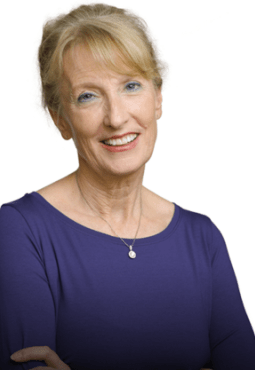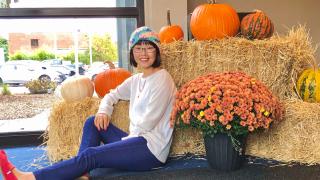“I’m very talkative. I have many opinions!”
She smiles when she says it.
Lihong “Sabrina” He has plenty to say and doesn’t hesitate to say it, even in places where silence is not exactly golden, but at least assumed or expected. Some Chinese men, she says, steeped in old traditions, find her volubility a bit off-putting. “So, I just make a lot of non-Chinese friends,” she laughs.
Her gift of gab is fueled by enormous curiosity about people, places and ideas. Born 37 years ago in a village in eastern China, Sabrina is a farmer’s daughter who had no intention of remaining down on the farm. She studied chemistry, biology, economics, marketing and international relations, then carved out a successful career in Shanghai as a pharmaceutical marketing manager.
Sabrina further indulged her curiosity by traveling all over Europe and Asia. Curiosity combined with opportunity motivated her eventual move to the U.S. in 2017. She settled in Dallas, working first for CVS, then spending two years at a stem cell facility.
The Shock of a Metastatic Breast Cancer Diagnosis
The trouble started in fall 2018, when Sabrina felt a large mass in her breast. She unwisely ignored it for six months, even as it grew larger, until “shooting pain” sent her to the hospital for a mammogram.
The news was not good. She had Stage 4 metastatic HER2-positive breast cancer, an aggressive malignancy that had already spread to her liver, bones and brain.
“I was scared. It hit me really hard,” she recalled. “I refused to deal with it. I wondered how this could happen to me. I was so healthy. I did yoga. I exercised every day. I went mountain biking. I always ate right.”
Her Dallas doctors wanted to begin treatment right away. Sabrina refused. “They told me I had three years to live, with or without treatment,” she said. She didn’t see the point. Another two months went by.
Regret From Delaying Cancer Care
It never dawned on Sabrina to seek a second opinion. Instead, she listened — foolishly, she now admits — to friends and colleagues who knew nothing about her particular cancer. Heeding their questionable advice, Sabrina tried so-called “alternative” and “holistic” treatments: A special diet consisting of just rice and mangoes. Supplements. “Fifty-two pills a day. I had a suitcase full of pills.” Vitamin C infusions. Blood purification. Nothing worked, and her pain got worse.
“I understand now how aggressive this cancer can be,” she said. “I should not have delayed or gone down those other routes. I regret that.”
By May 2019, Sabrina was suffering from “indescribable” lower back pain. A simple act like getting out of a car or sitting up in bed could take literally hours. One night, the pain was so intense that she collapsed on the floor, unconscious.
A friend who found her the next morning rushed her to the hospital, where she had emergency surgery to repair a fractured vertebra — a common occurrence when cancer invades the bones.
During her two weeks in the hospital, Sabrina lost 30 pounds, saying that the Dallas-area facility didn’t know how to properly feed a Chinese patient. “I couldn’t eat their food,” she said. “I looked like a ghost.” Meantime, she could barely move. Her mental state declined. She even went online to research methods of assisted suicide. She said nothing to her mother in China (“She couldn’t handle it”), but did tell her older brother, “So the family would know if I died.”
Second Opinion for Cancer Brings Hope
Sabrina finally agreed to drug therapy in June 2019, and was given a combination of Herceptin and Perjeta, targeted therapy drugs called monoclonal antibodies that disrupt cancer cell production. They worked — for a while. The mass began to shrink. But the back pain persisted. By September, the pain had spread to her leg and the tumor was no longer shrinking.
Sabrina now looked for a second opinion.
“Two people in my office both mentioned City of Hope,” she remembered. “Hearing it from two different people influenced me.”
They did more than recommend. A colleague drove Sabrina from Texas to Southern California. Her first stop was City of Hope’s Arcadia clinical network site, then later the main campus in Duarte.
“When I first met Sabrina,” recalled Jenny Lu, a bilingual clinical social worker for City of Hope’s Women’s Cancers Program, “she appeared as a frail and fatigued 34-year-old woman in a wheelchair.” Lu, a native of Hong Kong, recognized the roots of Sabrina’s initial reluctance to treat her cancer and her decision not to tell her mother.
“The traditional Asian response to a cancer diagnosis is often social stigma,” she said. “Asian religions interpret bad effects and suffering as the result of bad actions in this life, or a previous life. For an Asian cancer patient, it’s a source of guilt, shame and blame.”
Lu went right to work, counseling Sabrina while also helping her cope with the practical realities of cancer. She connected her with supportive care experts who provided financial aid resources, insurance assistance, help with utility bills and transportation, legal counseling and more. Lu also introduced Sabrina to a monthly support group for metastatic breast cancer patients (“This is a blessing,” Sabrina says). All of it would help her, essentially alone and jobless since leaving Texas, build a new community.
“It was important to start where Sabrina was. Actively listen to her story, be curious, assess her understanding of her cancer and treatment plan, assess her level of cancer distress, her support system, explore how her cultural beliefs and religion were impacting her decisions, offer coping strategies and provide resources that would give her back some control in a seemingly out-of-control situation,” Lu said, noting the close bond she formed with her.
“Jenny Lu,” Sabrina said gratefully, “is the perfect example of how a social worker can help.”
She relished the atmosphere at City of Hope.
“My doctor spoke Mandarin!” she remembered. “City of Hope understood the cultural differences. The meals were very healthy, with many choices. Everyone was so professional. All the employees were so nice. They deeply care. It felt like home.
“City of Hope is like a holy place to me.”
Oral Chemotherapy Helps Manage Cancer
Sabrina’s new medical team added the chemotherapy drug Taxotere (docetaxel) to her regimen, tempered by Neulasta to prevent infection. Later she was switched to Enhertu — an antibody-based drug that delivers chemotherapy directly to cancer cells, and later the chemotherapy pill Xeloda, which she still takes today. The treatments have been successful: Sabrina’s cancer has shrunk, and her pain has diminished as well.

“She’s an adorable person,” said oncologist Joanne Mortimer, M.D., City of Hope’s Baum Family Professor in Women's Cancers and director of the Women's Cancers Program. “It’s hard not to want to help her and take care of her. But she’s also very strong and resourceful. She lives every moment to the fullest and finds every resource for herself and others.”
Sabrina appreciates her relationship with Mortimer. “On the first day we met, she knew my whole case. I really respect that. With her, I’m very calm. She focuses on you. She’s very comforting, like a friend. She greets me with, ‘Hi cutie, how are you doing?’ I can see how she got the reputation that she cares. She really does.”
No one has any illusions here. Metastatic breast cancer is considered a terminal disease. Nevertheless, Mortimer does not share the only-three-years-to-live assessment. “Forty percent of [Stage 4] patients live eight years or longer,” she said. “And many new therapies are coming.” Plus, she points out that, nearly five years after being diagnosed, Sabrina’s cancer remains “shrunk and stable,” she has no symptoms and her mobility has greatly improved — she is no longer wheelchair-bound.
“Today, Sabrina is a confident, vivacious 37-year-old who ambulates independently, embraces life with daily exercise routines, participates in her church and remains an active member of the Living With Metastatic Breast Cancer Support Group,” Lu said. “Sabrina is unique in her willingness to share what she calls her ‘mistakes’ to benefit other cancer patients. I am humbled and privileged to be a member of Sabrina’s treatment team.”
Terminal Cancer Is ‘Part of Me’
“Sabrina knows she has a terminal illness, but she lives her life not paying attention to it,” Mortimer added. “She does what she wants to do.”
And Sabrina plans to do plenty. More travel. Community work — she babysits children at her church. And just getting down to the business of living, having learned many important lessons.
“Conquer your fears by educating yourself,” she said. “Listen to your body. No one knows it better than you. Get that second opinion, and find the right medical team right away. Take care of your mental health. And open yourself up to people. Let them know what kind of help you need.”
“I’m living a normal life,” she added. “I’m gardening. I’m painting. I’m exercising, taking community college classes. I’m not looking for longevity, but quality of life. I know I can’t be cured. I live with it. It’s part of me, but not the whole me. Enjoy the moment!”
For more information on City of Hope’s advanced services for breast cancer care, call 866-967-9683.
The Department of Supportive Care Medicine at City of Hope was the first in the United States to fully integrate across supportive care specialties and into the patient’s clinical care and is one of the largest programs of its kind today. The program provides cancer patients with comprehensive physical, psychological, social and practical support services, including care navigation; survivorship programs; specialists in cancer and aging; child life specialists; psychological and spiritual counseling; pain management; integrative medicine, such as yoga, massage and meditation; and more — all with a focus on maximizing patient and family strengths, quality of life and the ability to best engage in their treatment journey and beyond. Thanks to a gift from The Sheri and Les Biller Family Foundation, City of Hope is working to expand this offering across its cancer care system and to advocate for establishing supportive care as a standard best practice for cancer care in the United States.
